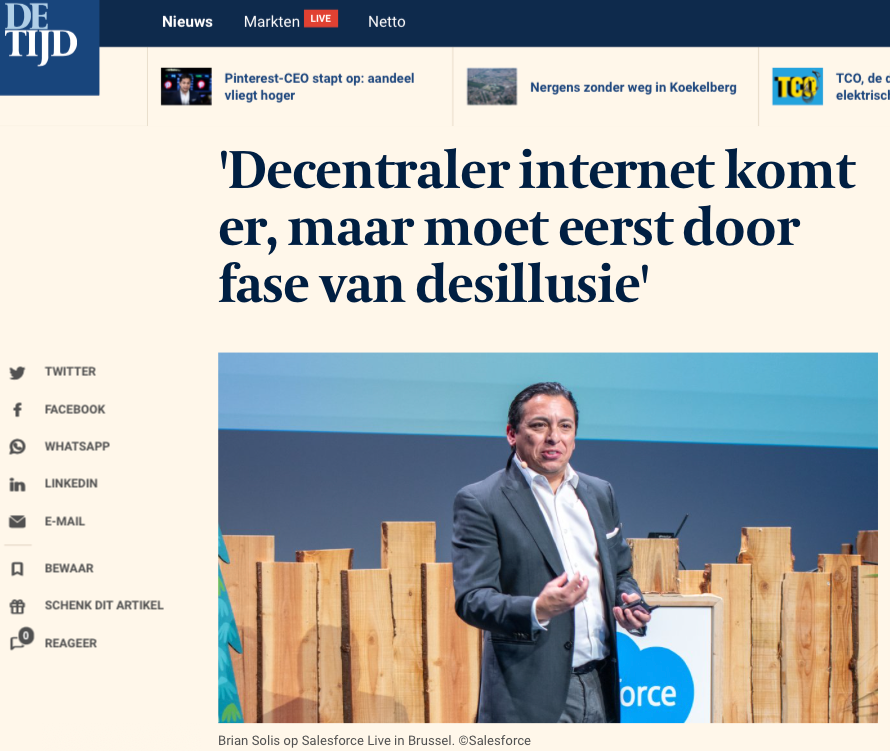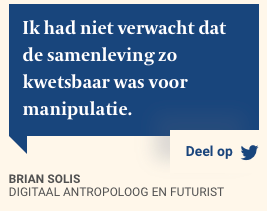
I had a chance to meet De Tijd’s Roland Legrand in Brussels, Belgium. It was an incredible conversation that I believe could have resulted in a series of articles. Thank you for the honor, Roland.
resource: time
Digital world anthropologist and futurist Brian Solis is optimistic about efforts to reshape, decentralize, and empower users. He warns that the so-called web3 must first go through a “valley of disillusionment.”
The web is now in its third version, web3, a movement to decentralize the internet and give users more control over their data and assets. Blockchain plays an important role in this, the technology that tracks assets and transactions in digital registers.
It is a response to Web 2.0, social media networks, and large internet companies that collect and control vast amounts of user data. When it came, the promise was that everyone could express themselves online. Solis was very positive at the time, but that assessment has changed. “I believe Web 2.0 will democratize information and give everyone a voice,” said anthropologist and futurist Brian Solis, global innovation evangelist at US software company Salesforce.
“The good thing about social media is that it does give us a voice, but it’s also the bad side. It also leads to the seeding of division. I didn’t expect society to be so vulnerable to manipulation and misinformation,” Solis said.
Social media also promotes addiction by encouraging you to do more on their websites and apps based on the number of likes and followers. “This is an unhealthy relationship with technology that distorts the meaning of life. No one likes to hear about them being addicted, but we need to do more about this problem, and we need government help,” Solis said.
promise
Web3 should be an alternative. “The promise of web3 is that you can control your data and how it’s used, not that it’s in the hands of a few big companies that control all the information,” Solis said. However, he immediately continued, “That’s the promise, we haven’t seen it yet.”
At this point, Solis points out, a major inequity in the web3 system stands out. 80% of the market value of non-fungible tokens (NFTs) is concentrated in 9% of accounts. Such tokens are proof of ownership on the blockchain of digital objects and became a real hype last year. The high concentration of this asset in the production of cryptocurrencies is also evident. 0.1% of Bitcoin miners account for half of Bitcoin’s “production”.
“Also, getting started with web3 is very difficult,” the futurist said. You have to have a digital wallet, buy cryptocurrencies like Bitcoin or Ethereum, then use it to buy NFTs, and then you have to store the NFTs securely. “We can complain about traditional banks, but they do provide a solid experience. The web3 user experience will improve, but is currently a major hurdle.
Cryptocurrencies are under enormous pressure right now, with several coins (in USD terms) depreciating significantly since the beginning of the year. According to American venture entrepreneur Kevin Ross, this will deter projects that are only aimed at making money.
“Rose is focused on the web3 foundation that transforms us from regular users to stakeholders,” Solis said. The digital anthropologist cited research firm Gartner’s hype cycle, which describes how a technology descends from a peak of inflated expectations to a “valley of disillusionment,” then up a slope of insight to eventually productive use.
disillusioned
For web3, Solis believes that “we are at the beginning of a journey to the valley of disillusionment. Crashes, loss of trust, and scams may be part of that.” But ultimately useful projects stand out and provide a better user experience. “We’re not going to see that tomorrow or next year, but we’re going to see it in the next five years. It’s going to be an experience we can’t imagine.
People already understand that cryptocurrencies have some value and that you can own NFTs, but that doesn’t mean they understand the importance of digital wallets managing your own data. It’s a whole new fact that your social contacts can also be included in this data. In other words, understanding and using web3 takes some effort. Entrepreneurs, users and politicians will find jobs to take advantage of new possibilities and combat the evils of web 2.0.
Essence
Brian Solis is a digital anthropologist and futurist. He warned about the ill effects of social media on users.
Web3 can turn these users into stakeholders and give them back control over their data, but those promises have yet to be delivered.
Web3 will go through a phase of disillusionment in the near future, the “Valley of Disillusionment,” but in the next five years, there will be useful applications and new possibilities, Solis said.


